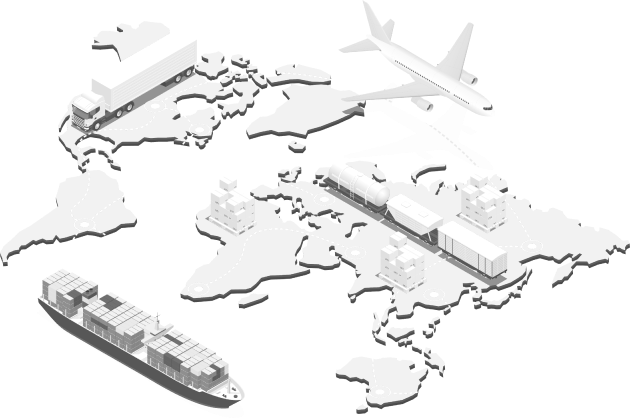
With much greater freedom, domestic carriers could “take flight” with their own route network. They could also choose what price to charge and what services to offer. But challenges emerged. While the economics of aircraft operation on a flight from New York to Los Angeles every day or several times a day were often financially viable, flying from one large city to a smaller one, or between two smaller city pairs often was not. Simply put, the load-factor numbers for passengers and/or expected cargo just didn’t crunch in a positive way for many – if not most – city pairs.
What Is A Hub and Spoke?
Presto, post-deregulation, airlines and air cargo operators began to introduce a more efficient hub-and-spoke route network. While Delta Air Lines had pioneered a form of hub-and-spoke operations at Atlanta in the 1950s, and Federal Express debuted its hub-and-spoke air cargo system at Memphis, in the early 1970s, it wasn’t until after U.S. airline deregulation that air hubs became the norm, not the exception.
That said, today’s airport hubs U.S. and across the globe have become efficient “transfer points” for passengers or cargo arriving by air from dozens of cities and then continuing on connecting flights to a final destination.
“Hub and spokes created economies of scale – an operational ‘green light’ for carriers’ eager to serve more cities but in a financially viable way,’” according to Omar Zambrano, chief operating officer of Prime Group in Miami.
In addition, consumers and shippers gained many more choices. Now travelers can choose which airline to fly, businesses can choose which carrier to put their cargo on from an outlying city, and customers can compare pricing, flight frequency, and services between all carriers. While it’s not a perfect system, given weather and operational issues at times, hub airports make good economic sense and work well much of the time. As a result, today, the hub-and-spoke networks have become the norm, rather than the exception.
Hubba Hubba
But there are hubs and then there are HUBS. In 2022, the Official Airline Guide (OAG) released its “Top 50 Megahubs” list, showing which airports are the “most connected” international hubs across the globe. Within that list, the Top 10 superstars, in descending order are:
- Chicago O’Hare (ORD)
- Dallas-Fort Worth (DFW)
- Atlanta (ATL)
- Seattle (SEA)
- Denver ( DEN)
- Los Angeles (LAX)
- New York (JFK)
- Mexico City(MEX)
- Houston (IAH)
- Miami (MIA)
As a highly experienced logistics, shipping and handling company, Prime Group (through its Prime Logistics and Prime Fresh Handling divisions) provides logistics, third-party shipping, and handling services through all these hubs and many more.
“Whether the materials are heading across town or to shops and distributors across the globe, expert logistical support is vital,” emphasizes Zambrano, who has overseen daily operations of Miami-based Prime Logistics for more than 21 years.
Zambrano says that “in total, we offer robust on-site logistics and warehousing services at Los Angeles, New York’s JFK, Miami, Amsterdam, Bogota, and Quito, where we have major operations.” He points out that in this year’s OAG list, LAX moved up to number 6, which is up from its 2019 ranking of number 13. Also, MIA moved up to 10th place, up from number 20 in 2019.
Top Global Air Cargo Hubs
SHIPHUB’s 2021 assessment of the top global air cargo hubs based on overall cargo tonnage also ranked Miami at number 8, and Los Angeles at number 9. Separately, data from Airports Council International showed Hong Kong to be the top cargo hub airport in 2021, but also performing well were Los Angeles at number 8 and Miami at number 12.
Beyond serving those top U.S. hubs and others such as JFK, Prime Group has major operations at El Dorado International Airport in Bogota, Colombia (BOG) which zoomed to number 18 on the OAG 2022 Megahubs list from 32nd place in 2019. And in a sperate list comparing Latin American hubs alone, BOG is actually at number 2 behind MEX. Also getting top billing on the OAK list is Amsterdam’s Schiphol Airport at number 31, serving as the company’s gateway to Europe, Asia, and the Middle East.
Launched in 2001, Prime Fresh Handling’s parent company launched service to represent several air cargo carriers involved in transporting flowers from Ecuador to Miami. The operation soon further expanded to Colombia, as well as to New York, Los Angeles, and Amsterdam. Now, Prime Group companies are each known as a major player on the worldwide cargo handling and logistics stage.
While Prime Group’s cargo has greatly diversified over the years – everything from lumber to pharmaceuticals, from household goods to fish, and yes the flow of flowers continues. Prime Group’s staff annually handle logistics, shipping, and handling for 90 million pounds of roses and other fresh flowers from Colombia to destinations across the globe.
“It’s all about being in the right place at the right time – all the time – with international gateway operations at several of the world’s top cargo airports – LAX, MIA, and AMS, among them – as measured by metric tons loaded/unloaded,” Zambrano noted. “We’re well-positioned to serve customers anywhere across the globe. As we manage, transport, handle and ship cargo, we able to assist our clients with best use of the global hubs, and that’s a plus for any business.”
About Prime Logistics Group
One of four divisions of Prime Group, an international logistics services conglomerate founded in Ecuador in 2001, Prime Logistics Group serves to streamline, optimize, and expedite freight to and from the U.S. for a wide range of major industries.
With offices in Quito, Miami, New York, Los Angeles, Bogota, and Amsterdam, Prime Logistics capitalizes on its long-time relationships with the major air carriers and ocean lines to offer competitive rates in securing ample space to destinations all around the world.
For information, call 305-592-2044 or visit www.primelogisticsgroup.com.


